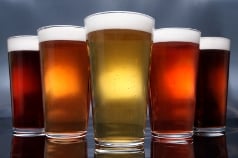This week I have a guest post by Jake Metzler, who spends his free time writing songs, brewing beer, and drinking his creations. He’s still perfecting the practice of doing all three at once. He also has a growing collection of brewing supplies and writes with Midwest brewing supplies.
 Some people argue that beer may be older than bread. After all, both use yeast. One cooks and one ferments. Fermentation could very well have been possible before fire had been utilized in cooking. Others claim that beer came from bread that had sat out too long and began to ferment.
Some people argue that beer may be older than bread. After all, both use yeast. One cooks and one ferments. Fermentation could very well have been possible before fire had been utilized in cooking. Others claim that beer came from bread that had sat out too long and began to ferment.
Whichever came first, it is true that beer has been around for a while. Ancient Sumerians worshipped Ninkasi, patron goddess of brewing. Czech legend has the god of hospitality, Radegast, inventing beer. The Finnish creation myth dedicates more attention to the creation of beer than that of humanity.
Like many things, beer brewing has a rather cyclical nature. Home Brewing has experienced highs and lows in terms of popularity. Alcohol was made domestically in ancient Egypt. Wine and beer have long been common and even sacred beverages, wine being used in religious ceremonies for over 7,000 years. In fact, despite taboos, alcohol has been associated with religion for centuries. Many monasteries have brewing facilities; Martin Luther’s wife brewed beer in the bathtub.
In ancient Sumer, throughout Europe, and in the colonial United States, it was common for women to do the brewing. After all, they did the cooking, so it made sense that they’d tend the beverages as well. It is often joked (and it is true) that in some places, beer is cheaper than water. During colonial times, beer was also safer than water, as it had been boiled and could not contain all the pathogens that water did.
Prohibition caused many Americans in the 1920s to start brewing their own alcohol. Cans of malt syrup would be sold with “warnings” not to boil in water with hops and then add yeast (instructions for making beer). When prohibition ended, the making of wine at home was legalized, but beer was overlooked in that act and home brewing of beer was not federally legalized until 1979. Since states can regulate their own alcohol laws, home brewing has been slow to be legalized in all 50 states. Both Alabama and Mississippi are working on laws to legalize home brewing, which would mean that all states allow brewing to some extent. Individual states have their own laws on brewing limits, where the beverage can be consumed, and whether or not it can be sold.
In 2010, it was discovered that Oregon’s law did not allow for home brewed alcoholic beverages to be consumed outside the home. This meant that the home brew competitions that had been at state fairs for over 20 years had to stop. Home brewer’s clubs were limited in what they could serve at meetings. With an onslaught of media attention, legislators quickly addressed the issue and by March 2011, the law was changed, and state fair competitions reinstated.
Regardless of legality, brewing has been a popular hobby throughout the history of society, and will most likely continue to grow. In modern America, craft brews are gaining popularity. Most of these brews started off as home brews and became commercial down the road.
There are many reasons people choose to brew. Some like the activity. Others find it cost-efficient. The “green” movement has increased the number of people who grow their own food. This also leads to more people producing their own beverages, including alcohol.
Brewing at home allows you to regulate the calories, alcohol content, and ingredients in your brew. People with allergies and diet restrictions might find it more convenient to make their own alcohol rather than hunt for wheat-less beer or low-calorie wine.
Home brewing also allows for flavor adjustment and experimentation that store-bought products just can’t supply. Even the white-house has now joined the home brewing trend. Though this is the first beer brewed in the white house (that we know of), some of the founding fathers were known for their homemade brews, namely George Washington and Thomas Jerfferson.
Nowadays, brewing your own beer seems to be all the rage. All over the country, hipsters, rednecks, artisans, pretty much a human from any walk of life can be a successful brewer if they put heart and effort into the practice.
Do you know your state’s laws on home brewing? How do you feel about federal regulation of alcohol production, consumption, and trade? Share your thoughts in the comments below.
Related Beer Brewing Articles from BeerSmith:
- Ancient Brews with Dr Patrick McGovern – BeerSmith Podcast #153
- Alcohol Tolerance in Beer Yeast and BeerSmith 3
- Kegging Still Mead, Wine and Cider
- Blending Traditional Sour and Barrel Aged Beers
- AHA Update with Brew Guru Gary Glass – BeerSmith Podcast #134
- Why is Beer Brewing So Technical?
- Counting Calories in your Homebrewed Beer
- Radical Brewing by Randy Mosher – Book Review
Don't make another bad batch of beer! Give BeerSmith a try - you'll brew your best beer ever.
Download a free 21 day trial of BeerSmith now



{ 2 comments… read them below or add one }
That was cool.
I don’t know my state ‘laws’ hear in Australia but I know thare not real any way!probably like over there! Did you know your income tax law is not constitutional? That’s about 25 % of your money? And it all goes to paying off the interest on the national debt , to the money changers
Good read, Brad, thanks, see you in Portland in June. Brew on!